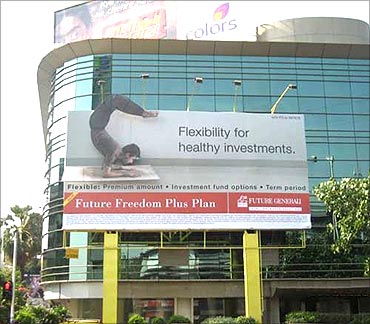Photographs: network2media.com Niladri Bhattacharya in Mumbai
Future Generali India Insurance Company, a joint venture between the Future Group and the Italy-based Generali Group, is eyeing Rs. 900 crore (Rs. 9 billion) of gross premium writing during 2011-12.
K G Krishnamoorthy Rao, managing director and CEO, tells Niladri Bhattacharya that despite current underwriting losses, the company expects to break even by 2013-14. Edited excerpts:
In the background of the recent experience in Japan, don't you think India needs an insurance pool covering catastrophic events?
First, we need to have premiums for catastrophe events, like what they have in the developed countries. Although fire insurance covers accidents and floods, earthquake cover is optional.
Fire insurance accounts for around 15 per cent of the premiums collected annually by the industry, which comes to around Rs. 5,000 crore (Rs. 50 billion).
So, the premiums are pretty low, compared to the risks covered. We need to develop a 'cat-pool', as bigger risks need to be covered separately, and mark minimum rates for catastrophe covers.
...
'Premiums needed for catastrophes'
Image: Premiums of sectors like motor and fire have come down.A number of issues like under-pricing and losses in third-party motor pool have affected growth in the general insurance sector. Most companies are still underwriting huge losses. Your observation?
Post de-tariffing (deregulation of rate-fixing, in Jan 2007), the premiums of sectors like motor, fire and engineering, which constitute more than 50 per cent of the industry, have come down.
This has affected the margins. But the industry has started to stabilise and over the past two years, we have been growing steadily by 20-22 per cent.
Being accountable to shareholders, companies cannot survive with such losses and industry must strive to generate underwriting profits.
Losses in the third-party motor pool continue to hurt the industry, especially smaller players. What could be the hit for your company, since 50 per cent of your premium comes from motor insurance?
The Insurance Regulatory Development Authority has increased provisioning requirements in third-party motor insurance to 150 per cent. How will it affect your company?
...
'Premiums needed for catastrophes'
Image: Future Generali expects to break even in two years.Taking the expenses into account, the total rise required to offset the total losses should be in the region of 100-120 per cent. By the reports, the regulator has proposed a hike of 80-85 per cent, so losses will be there next year as well.
On the motor pool, our exposure is proportional to our market share of around 1.5 per cent. Similarly, on provisioning requirements, we are already 180 per cent overall in terms of solvency margins.
So, a 150 per cent solvency requirement will not affect us.
You have lowered your underwriting losses considerably. When do you see Future Generali breaking even?
We expect to break even in another two years, that is, by the end of financial year 2013-14.
...
'Premiums needed for catastrophes'
Image: Future Generali is looking to grow its portfolio.Photographs: indiaprwire.com
So for in the current financial year, Future Generali has written premiums worth Rs. 550 crore (Rs. 5.5 billion). What is your projected premium growth in 2011-12?
In the current financial year, we will end up with around Rs. 600 crore (Rs. 6 billion) of new business and during 2011-12, we are expected to reach the Rs. 900-crore (Rs. 9-billion) mark.
Of this, motor, health and fire will constitute 50 per cent, 18 per cent and 13 per cent, respectively. Whereas, engineering and marine will contribute 10 per cent of total premiums.
What will be your focus area over the next two years?
First, we are looking to grow our retail portfolio. Currently, the mix between retail and corporate is around 60:40, which we plan to increase to 65:35 by the end of next year.
Second, we are looking to grow our agency base. On the product side, we will be coming out with health products in personal lines, which will be a combination of hospital benefits, critical illness and reimbursements.
We will have a suit of health insurance products targeting micro insurance, middle income group and high net worth individuals.
Apart from this, we are also concentrating on niche segments like liability cover for event insurance and films.







article